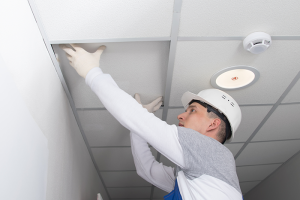Promoting the role of facility manager
Health care facilities managers faced many challenges during COVID-19, and one of the biggest for some of them was making sure their voices were heard when decisions about expanding or modifying their facilities were made. The importance of advocating for themselves was never more apparent than during this past year.
“I think the issue is really explaining and making it clear as to where the facility managers should be involved and their role in the physical environment,” says Chad Beebe, AIA, CHFM, CFPS, CBO, FASHE, deputy executive director of the American Society for Health Care Engineering. “Whenever something impacts the environment of the hospital, the facility manager should be involved.”
A key role of facilities managers during COVID-19 was interpreting the codes and regulations that were in play, such as those related to adding or reconfiguring physical spaces and those concerning infection prevention. In order to play that role, however, facilities managers need to be knowledgeable and proactive, notes Jeff O’Neill, AIA, ACHA, CHFM, co-chair of the International Code Council Committee on Healthcare and senior director of facilities at Penn Medicine’s Pennsylvania Hospital.
“Having a very solid handle on the regulatory requirements is essential. Not just the numbers, but the reasons why,” O’Neill says. “And you have to be able to articulate that to the care team. You can’t sit down in your office in the basement. You have to be up there and be a team member.”
Furthermore, the relationships facilities managers have with members of the care team need to be fostered well before a crisis hits, says Brad Pollitt, AIA, vice president of facilities at University of Florida Health Shands Hospital. This means learning who does what in the hospital and collaborating with them whenever something they are doing affects the physical plant.
“What I would tell any facilities manager is that you have to nurture those relationships early and often,” Pollitt says. “If I were new in a position, I would make a point of going to some of the leaders, introducing myself and asking, ‘What are your biggest complaints regarding facilities? If you were in my shoes, what priorities would you focus on? What information and data can I give you to make you more successful?’ Facilities management touches everything, and this interface on a personal level can help everyone succeed.”





